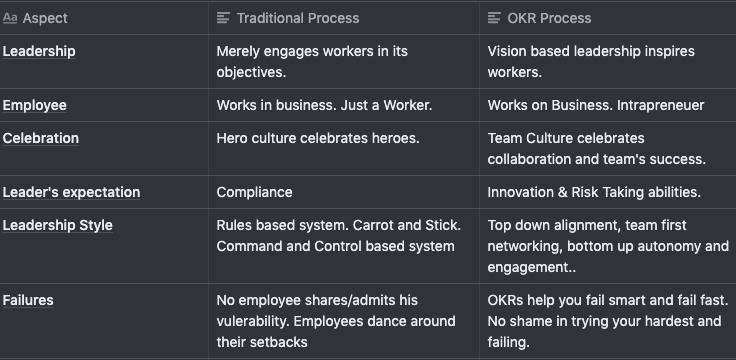Lots of organizations are trying to adopt OKR launchpad for their growth. What intrigued me the most is the right organizational culture for the transformational impacts of OKR & CFR methodology to take place.
A thread on my learnings from Measure What Matters by John Doerr.
OKRs focus your efforts, foster coordination and enhance workplace satisfaction. They are the vessels of its leader& #39;s priorities and insights.
OKRs focus your efforts, foster coordination and enhance workplace satisfaction. They are the vessels of its leader& #39;s priorities and insights.
CFR (Conversation, Feedback and Recognition) help in transmission of those priorities and insights to the entire workforce.
A strong and positive culture is absolutely essential for OKRs since its a system where teams assume collective responsibility for goal achievement or for failures.
At the same time, individuals are held responsible for specific key results. Peak performance is the product of collaboration and accountability.
Another way of looking at it is that High motivation cultures rely on a mix of two elements - Catalysts and Nourishers. Catlaysts may include setting clear goals, allowing autonomy, providing sufficient resources and time, helping with work, allowing free exchange of ideas, etc.
Nourishers are acts of interpersonal support : respect and recognition, encouragement, emotional comfort, opportunities for affiliation, etc.
While OKRs give us a sense of purpose and clarity. CFRs fill us with the energy we need for the journey.
While OKRs give us a sense of purpose and clarity. CFRs fill us with the energy we need for the journey.
Challenge is that very few people understand the business rationale behind OKRs.
Its rightly said, without cultural alignment, even world& #39;s best operational strategy fails.
Its rightly said, without cultural alignment, even world& #39;s best operational strategy fails.
Infact, any leader should be able to see if his organization is not making the best of OKR methodology if he notices few symptoms:
1. If an HR person is running around nipping at manager& #39;s heels to get updated numbers before the board meeting.
1. If an HR person is running around nipping at manager& #39;s heels to get updated numbers before the board meeting.
2. If managers do not have true idea as to how their objectives link up to what organization is trying to achieve.
3. If some senior leaders function in an old school, autocratic approach.
4. If people are not asking the questions like What& #39;s in it for me.
3. If some senior leaders function in an old school, autocratic approach.
4. If people are not asking the questions like What& #39;s in it for me.
5. If people dance around their setbacks instead of accepting them and improving upon them.
6. If the guy at the lower end of value chain can& #39;t freely talk to people at higher end of value chain.
6. If the guy at the lower end of value chain can& #39;t freely talk to people at higher end of value chain.
There is no handbook to address questions that arise while building right cultural experience for your colleagues. The wisdom resides in leaders with personal connections to their teams, to managers who can show what success looks like and know when to declare victory.
Only then answers to questions like the ones mentioned below become obvious.
1. Why is transparency important
2. What is true accountability
3. When is it time to stretch team& #39;s workload.
1. Why is transparency important
2. What is true accountability
3. When is it time to stretch team& #39;s workload.
Thanks for the learnings @johndoerr

 Read on Twitter
Read on Twitter


